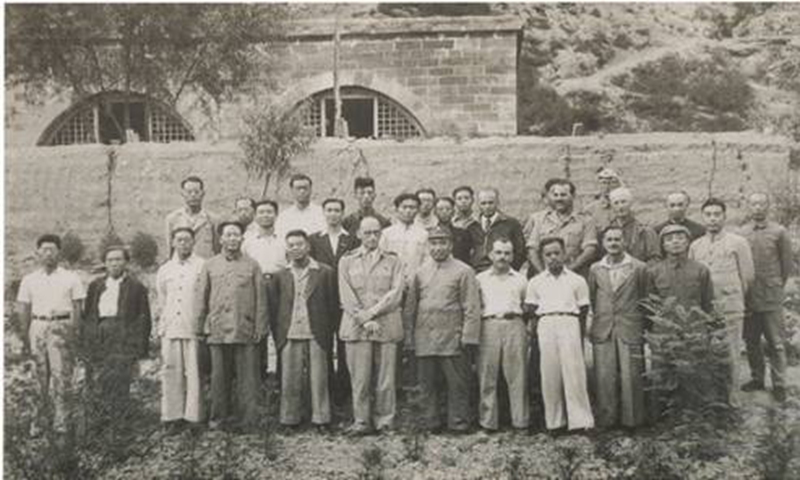
Group photo of Mao Zedong (first row, fourth from left) and the northwest China visiting team of Chinese and foreign reporters at Wangjiaping, Yan’an in June 1944
After the outbreak of the War of Resistance against Japanese Aggression, the Kuomingtang (KMT) adopted a strict policy to block news coverage of Yan’an and the CPC’s resistance against Japanese aggression. “Just what was happening behind the blockade? Were these Communists really as bad as they were painted by the Government authorities? Were they oppressing the people? Just what part do they, or can they, play in the war against Japan?” These questions were on the minds of foreign reporters. They believed that instead of relying merely on the KMT’s side of the story, only by seeing with their own eyes and hearing with their own ears could they find the answers. Breaking various obstacles set by the Nanking Government, they eventually embarked on the journey.The CPC Central Committee attached great importance to the visit of Chinese and foreign reporters. Zhou Enlai personally took charge of the reception. He instructed all departments to prepare materials for a comprehensive overview of their work, and get ready to answer any questions from the reporters. Questions that fall within the portfolio of each department must be clearly and seriously answered. Evasion or vagueness would not be accepted. Presenting detailed materials and specific facts was the only way to win others’ trust. Zhou also pointed out to the Yan’an Communications Department, which was responsible for the reception, “publicity should stay true to facts. While presenting our achievements, it is also necessary to admit our mistakes and shortcomings, and explain our solutions to overcome them. Never exaggerate or cheat.” “In addition, we must be sincere and candid, and make friends with the reporters,” said Zhou. It was in such an open, upright, aboveboard and confident attitude that the Communists received the Chinese and foreign reporters.
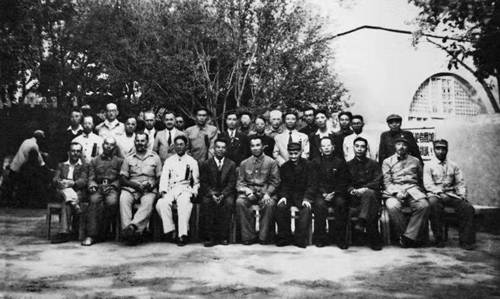
Group photo of the northwest China visiting team of Chinese and foreign reporters, Zhu De (first row, middle) and Zhou Enlai (first row, third from right) at Wangjiaping, Yan’an in June 1944
On 9 June 1944, after a tortuous journey, the reporters finally arrived in Yan’an and were warmly welcomed by the leaders of the CPC and people from all walks of life. In more than a month, the Communications Department made arrangements for them to visit offices, schools and production facilities, attend gatherings, and interview heroes, role models, writers, artists and well-known figures of all social sectors. Foreign reporters were impressed by the open and aboveboard manner of the Communists. Stein wrote that he had complete freedom to carry out investigation and go wherever he wanted, and that no question was forbidden, no question was rejected. For reporters who previously had known nothing about the Liberated Areas, this trip opened a door to a new world. What they saw was completely different from what they had been told. Deeply impressed, they sent out a large number of reports. In June, they sent 30 telegraphs, recognizing the role of the CPC and its armed forces in the war of resistance against Japanese aggression, and criticizing the KMT’s anti-Communist policies. Dong Biwu mentioned in a report that a foreign reporter told him that before coming to Yan’an, he thought the CPC’s publicity was a little exaggerated, but after his arrival, he thought it was far from sufficient.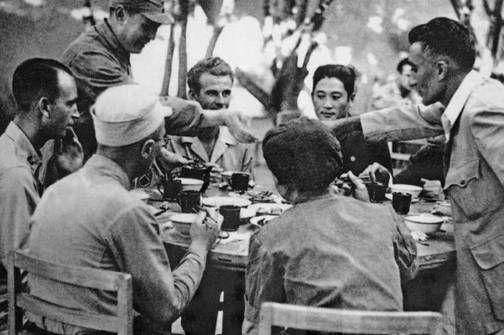
The northwest China visiting team of Chinese and foreign reporters were invited to a dinner at the Headquarters of the Eighth Route Army at the Wangjiaping Peach Orchard in June 1944
Since ancient times, the Chinese people have sought to look at the world with open eyes. Likewise, the trip to northwest China provided the world with an opportunity to look at China.In the Jinsui Anti-Japanese Base Area (in today’s northwest Shanxi and Inner Mongolia), the Chinese and foreign reporters witnessed a fierce battle in which the Eighth Route Army (or Paluchun) removed a Japanese stronghold. They were amazed and called it a miracle that a well-protected fortress was taken down without aircraft or artillery. The rumor that the Eighth Route Army wandered aimlessly without launching attacks was thus dispelled. Foreign reporters whose eyes were opened wrote multiple articles about the heroic resistance of the Eighth Route Army against Japanese aggression. Stein wrote in an article for US newspaper The Christian Science Monitor that he was stunned when he found such a vibrant new society behind the blockade, that during his five-year stay in Chongqing, he had heard nothing but malicious slanders about the CPC, that facing what he found in Yan’an, he rubbed his eyes in surprise. Maurice Votaw, an adviser to the KMT’s publicity department and an American reporter considered “politically reliable”, also changed his mind after the Yan’an trip. He said at a joint press conference that he had opposed the CPC and the Eighth Route Army in the past, but the trip to Yan’an and northwest Shanxi proved him wrong.
The battle behind the enemy lines was breathtaking, and the relationship between the army and the people was stirring. When the Eighth Route Army won a surprise attack in Fenyang, “a string of villagers was moving up the trail from the below. … An old laopaishing came up, grinning. He was carrying a basket of eggs — a present for the Paluchun heroes. They all had presents, ... wanted to prove how much they welcomed the fighting of Paluchun. They... carried baskets of fruit, bunches of vegetables, pumpkins, nuts, and chickens.” The scene was so touching that the author Forman exclaimed that he had been in China for more than ten years, but he had never seen such a warm and vivid scene of military-civilian cooperation and of civilians expressing gratitude to the military. He was told in the past... that the people feared and hated the Paluchun, but these lies were debunked by what he saw.
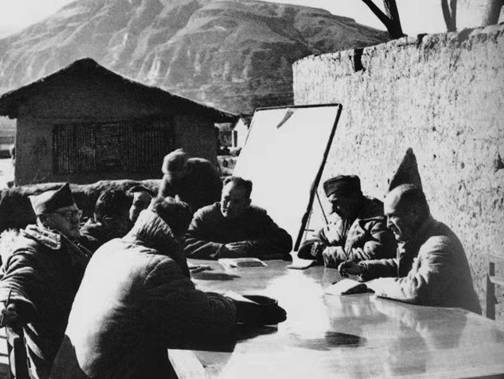
Chief of Staff Ye Jianying briefing the northwest China visiting team of Chinese and foreign reporters on the CPC’s resistance against Japanese Aggression
The reporters were impressed by the little-known war of resistance against Japanese aggression behind enemy lines and awed by the sincerity of Mao Zedong. Mao took the reporters’ visit very seriously. He met with them, answered their questions, and held talks with many of them. When Forman asked, “Why don’t you change the name — change it to ‘Neo-Democracy,’ or ‘Democratism,’ or some such — anything but ‘Communism’?” He shook his head. “It doesn't matter to us or to our consciences what we or others call our system. And if we were to change suddenly to some other name, there are those in China today — and abroad, too — who would make capital of it, would accuse us of trying to cover up something. No — we cannot, we must not, change the name. Nor do we need to. It is the content and the practice that are important — not the label!” Facts speak louder than words. True gold fears no fire. With such steadfastness and confidence, when Stein asked what they relied on to direct the government and the army, Mao replied that they relied on the trust of the people, the 86 million people currently governed by the new democratic governments at all levels.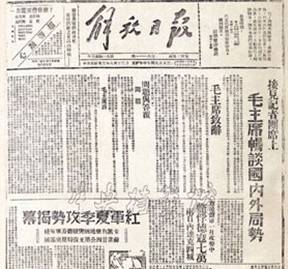
Chairman Mao’s editorial on the Situation at Home and Abroad at the Meeting with the Chinese and Foreign Reporters, published on Jiefang Daily on 13 June 1944
Mao wrote in an editorial for Jiefang Daily that “most foreigners and the Chinese in the rear area still do not understand what the CPC really is.” “But facts speak louder than words, and the truth will prevail. At the end of the day, both foreigners and Chinese will become clear-eyed. In fact they are now beginning to know more about us.” The rooster has crowed and all under heaven is bright. Thanks to the fair reports of the Chinese and foreign reporters, all the smear campaigns against the Eighth Route Army have been shattered by facts, and the blockade will no longer work. The real CPC, with its sincerity, candor, openness and confidence, has dispelled the dark clouds and stepped into the world stage.